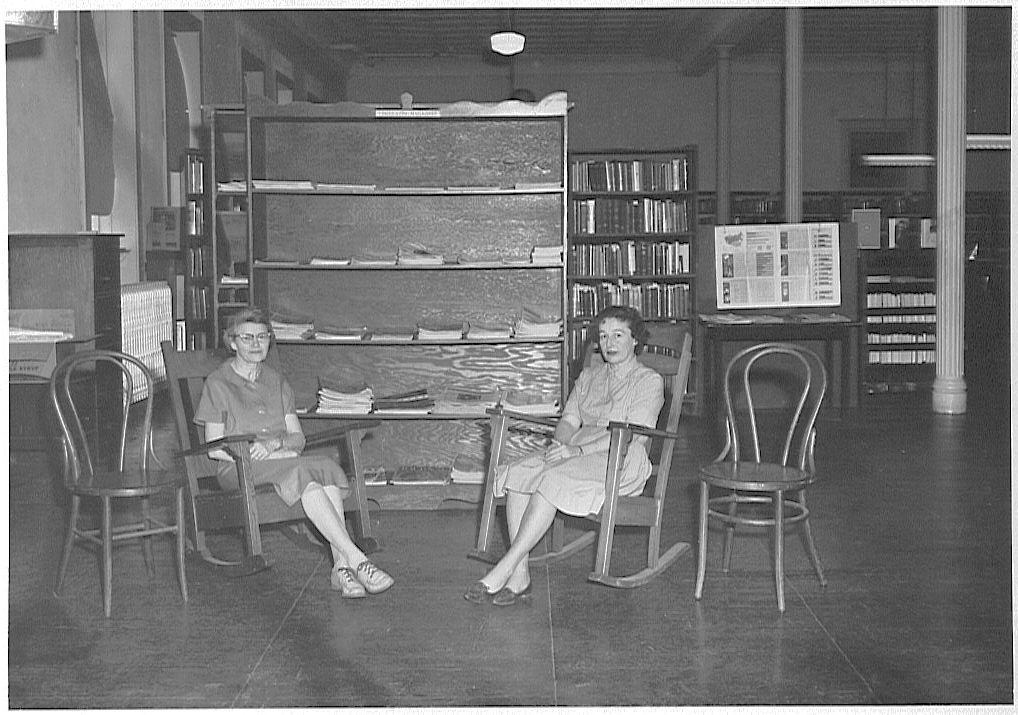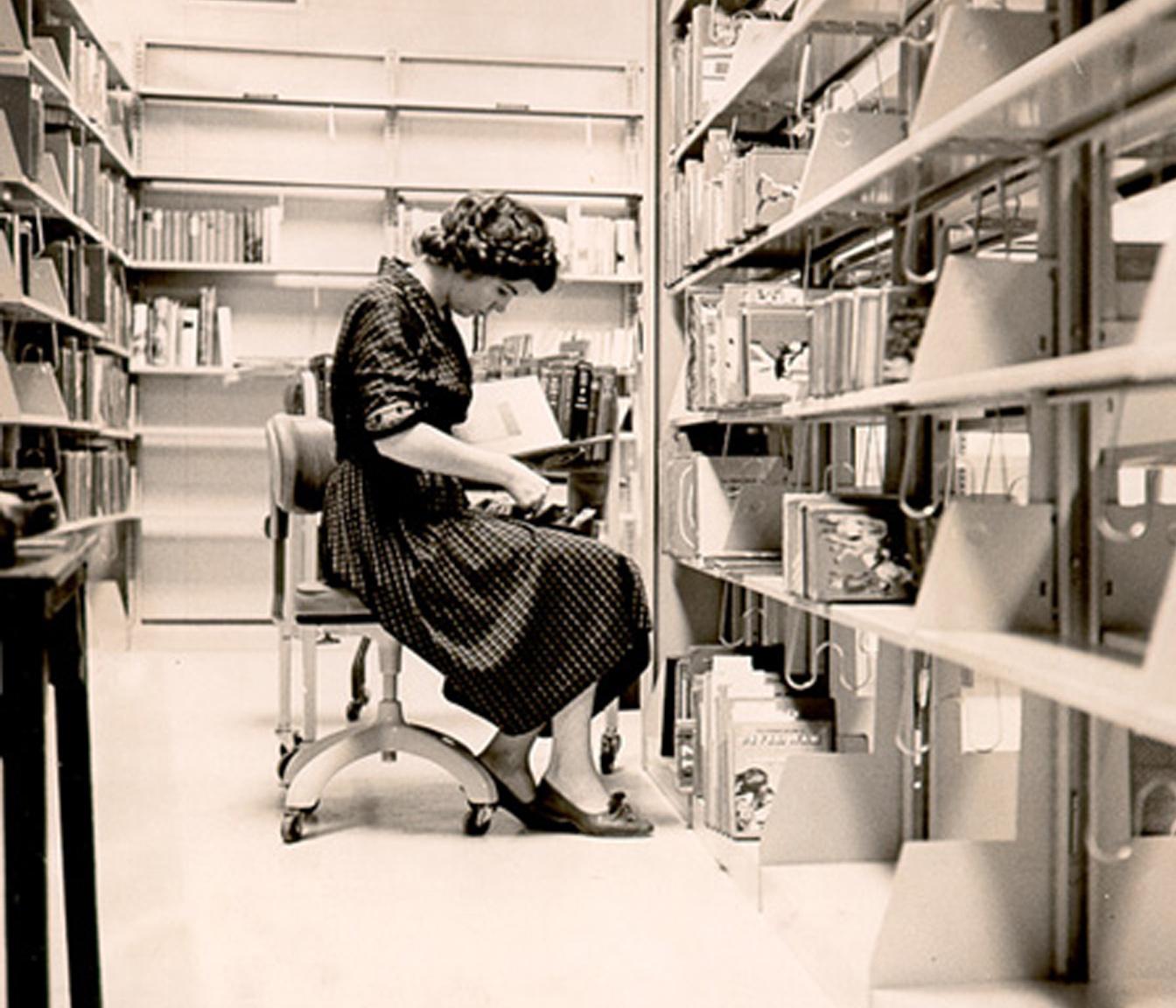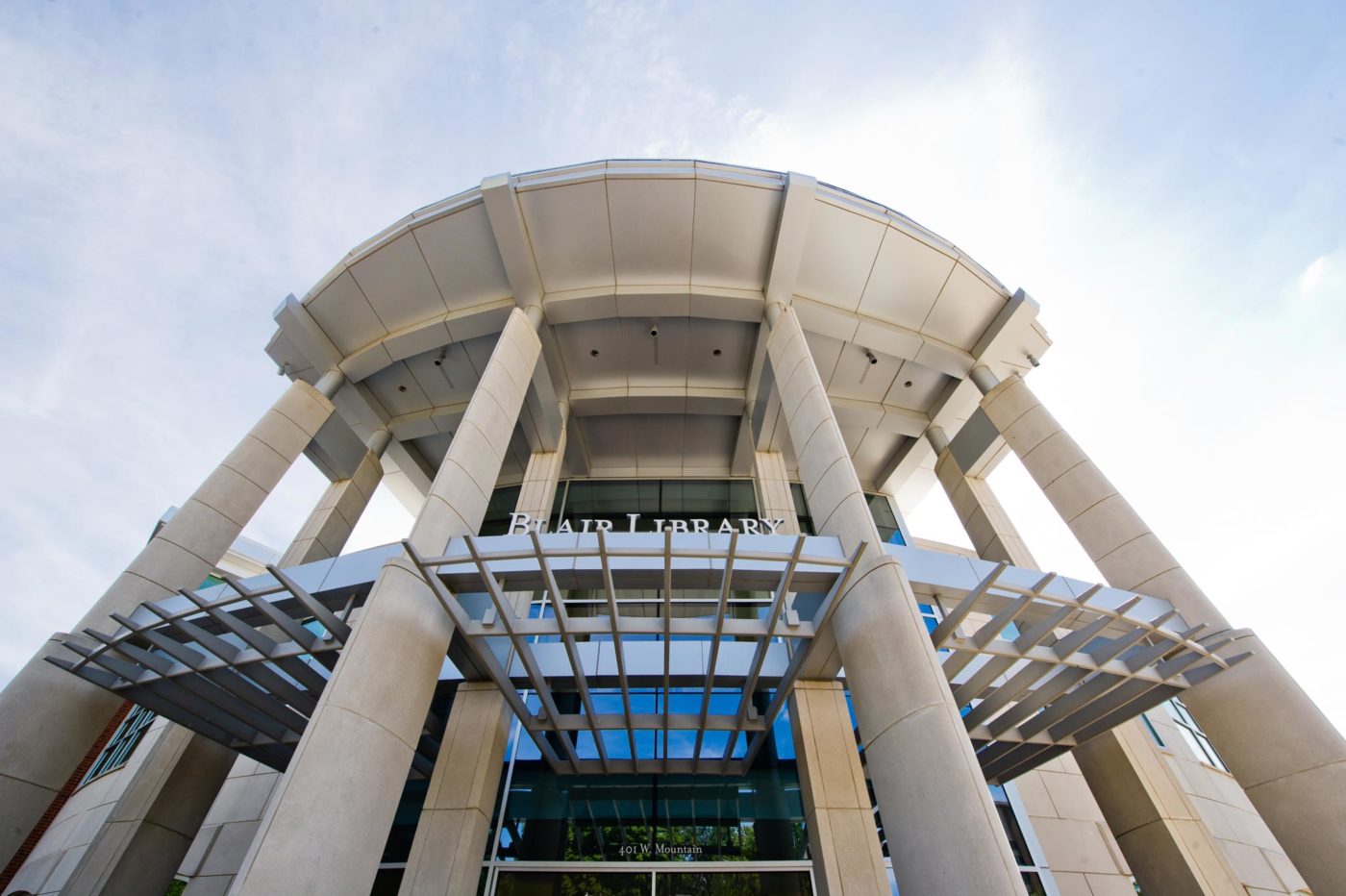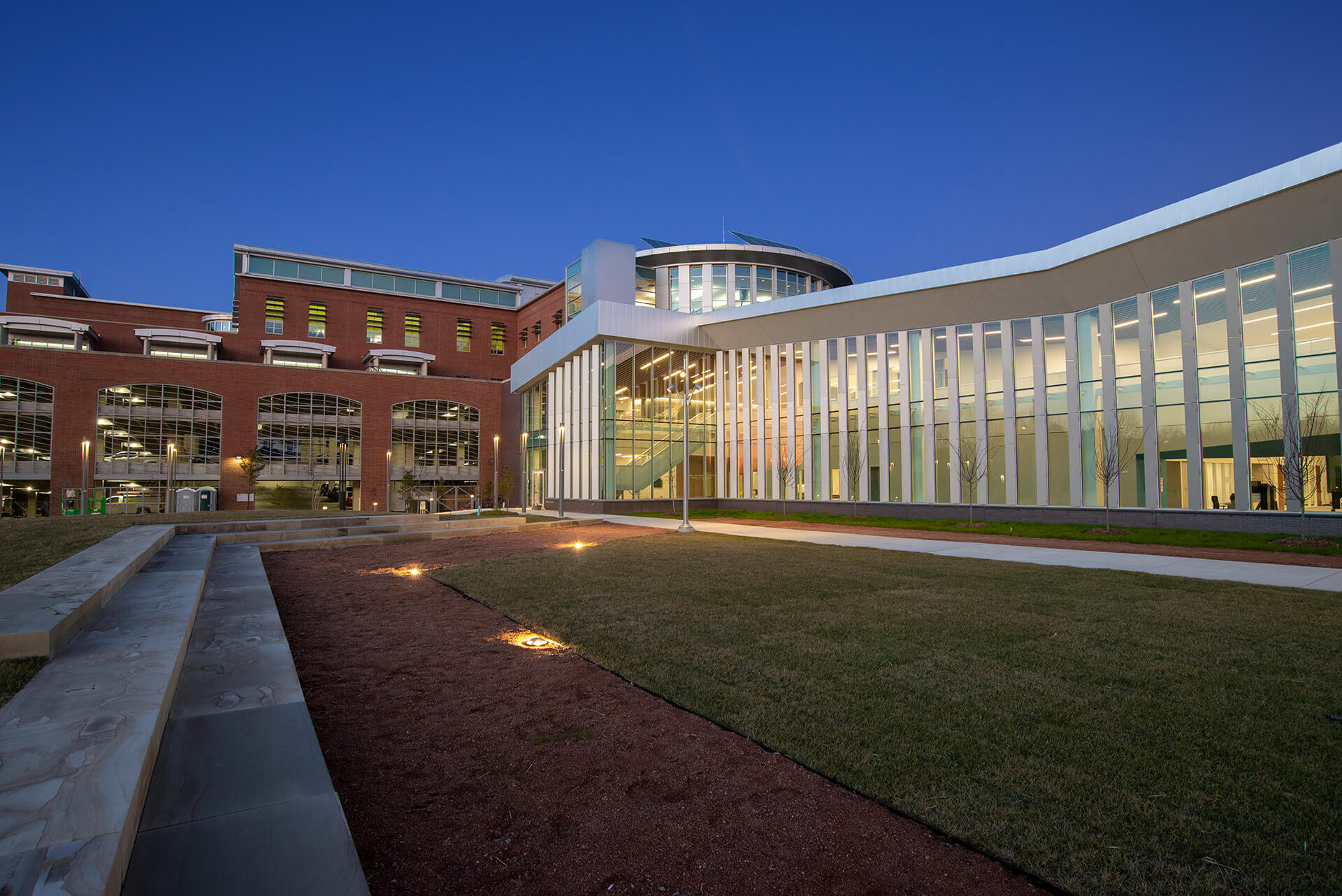A group of citizens led by the University of Arkansas librarian Julia Vaulx established the Fayetteville Public Library in 1916. The library originally occupied two rooms of the Washington County Courthouse basement, and operated on a budget of $840.15 in its first year. With community support, the library moved to a cottage at East Avenue and Meadow Street, and in 1937 settled in the City Administration building, where they remained for 25 years. The library grew significantly under the leadership of Irene D. Galloway, who became head librarian in 1935. A dedicated fundraiser, Galloway used her "Library Chat" column in the Fayetteville Democrat to solicit "benefactions" and to educate the community about the library's resources.
Following World War II, Fayetteville's economy boomed and its population doubled. The cramped quarters in the City Administration building were strained to the limit, and the decision was made to build.

Planning for a new library began with donations by residents like former director Julia Vaulx, who bequeathed $1,000 to the building fund upon her death in 1955, and by Gilbert Swanson, who donated a site on East Dickson Street, then valued at $35,000, in memory of his mother-in-law, Roberta Fulbright. In July 1959, the City of Fayetteville assumed ownership and operation of the library, and in November of the same year passed a $225,000 bond issue to fund a new building.
Architect Warren Segraves, a native of Fayetteville, designed a two-story building of brick, steel, and glass that opened the library to views of its beautiful site on the southern edge of the Washington- Willow historic district. The building was constructed, furnished, and its grounds landscaped for just over $300,000. Senator J. William Fulbright and over 1,000 guests dedicated the new library on June 4, 1962. In 1966 the Fulbright Foundation presented the library with $13,500 to buy land east of the site for an expansion. In May 1970 the 3,200 square-foot addition costing $90,000 opened for service. In December 1989, the City of Fayetteville purchased the property to the west (a medical office building designed by Warren Segraves) for use by the Fayetteville Public Library. The project, completed in 1992, joined the two buildings and resulted in a 31,500 square foot facility housing the Fayetteville Public Library, Ozark Regional Library System headquarters and the Talking Books service.
On July 1, 1999 the Washington County Library System was established as a result of the dissolution of the two-county Ozark Regional Library System. In 1999, the Talking Books service was split between the Fort Smith Public Library and the Arkansas State Library and the space was converted into a twelve station computer center funded by the Bill and Melinda Gates Foundation. In late 2000, when the Washington County Library System moved to its own facility the space was converted for staff and FPL Foundation use.
On October 1, 2002, a referendum to establish a 1 mil city library tax was approved by 85% of the voters. On May 20, 2003 the Fayetteville City Council approved ending the inter-local agreement with the Washington County Library System and establishing the Fayetteville Public Library as an independent city library beginning January 1, 2004.

On August 15, 2000, Fayetteville citizens overwhelmingly (75%) approved a 1% 18-month sales tax to help fund a new main library. A capital campaign, chaired by Ann Henry, was undertaken to raise funds to complete the project and endow operations. Jim Blair announced a $3 million donation on February 27, 2002. The building was to be named Blair Library in honor of Mr. Blair's late wife, Diane Divers Blair, grandmother and aunt. Groundbreaking was held April 27, 2002 and construction commenced in June. A topping out ceremony was held September 13, 2003. Substantial completion of the $23.3 million 88,000 square foot Blair Library in September 2004 was followed by a month of opening celebrations beginning October 8, 2004. The building's architect is Jeffrey Scherer, FAIA, Meyer, Scherer, Rockcastle, LTD.
In 2005, the Fayetteville Public Library wins the coveted national Library of the Year award sponsored by Library Journal and Thompson/Gale Publishers, given annually to the top library in the country. The award was given for outstanding service to the community, ahead of the Seattle Public Library and many other prominent libraries.
LEED Silver Celebration
The building was the first in Arkansas to be registered with the U.S. Green Building Council's Leadership in Energy and Environmental Design (LEED) certification program. Blair Library was award the LEED-Silver (NC) certification in the fall of 2006. The building was paid for in cash and is debt-free.
In 2006, the library was named an American Landmark Library by TravelSmart newsletter. The library was cited by the New York Times in its travel section. Also in 2006, a millage increase that would ensure predictable stable funding was defeated by 219 votes.
During that summer, the library celebrates its 90th birthday, and in December 2006, the library receives a silver certification from the U.S. Green Building Council for its use of environmentally-friendly strategies in building and operating the library.
In the spring of 2007, FPL kicked off The Big Read, a program from the National Endowment for the Arts that encourages cities to read and discuss one book. Fayetteville was one of only 72 cities selected to participate in this program, and received a $20,000 grant to carry out this effort.
The summer of 2007, the library began its 70th summer reading club program, where more than 11,200 people attended summer reading programs in June, July and August. In July alone, children checked out 32,123 items.
In 2006, 863,484 items were checked out, 999 programs were provided for children, families, teens and adults, and more than 13,000 items were added to the collection. The library's collection encompasses over 200,000 items, including books, CDs, DVDs, videos, audiotapes, e-books and parenting kits. The library's digital collection includes downloadable audiobooks and over 50 databases covering a wide range of interests including business, music, auto repair and literature – in short, something for everyone.
The library is open 61 hours per week. In 2006, over 550,000 people visited the library, 49,000 attended programs, and 3200 used the library's wireless network.
The library received a National Endowment for the Humanities Challenge Grant for a proposal entitled “A Richer World, A Deeper Community” in 2007. It is given to only seven institutions annually and is a 5-year grant with a 3:1 match by NEH. The grant will establish a $2M Humanities grant to permanently fund materials and programs.
FPL received an IEEE grant for Solar Bug Tug program. In 2008, a youth component of the national solar boat race hosted in Fayetteville and it was featured on cover of Fayetteville, Springdale & Rogers Street Guide, 1st edition, Rand McNally & Company.
In 2009, the library was named Best Library in NWA by Citiscapes readers’ poll; runner up for Best Architecture/Best Building and was selected to serve as one of four case studies in a national study funded by the Institute for Museum and Library Services and conducted by the University of Washington on the social, economic, personal, and professional value of free access to computers at public libraries. Also that year, FPL wasone of nine libraries out of 515 nationwide to receive the International City County Management Association Grant for Public Library Innovation (in partnership with the Bill and Melinda Gates Foundation) for a project entitled “Solar Test Bed.”
By 2010, Mayor Lioneld Jordan was named “Political Winner” by Library Journal and Youth Services Manager Lolly Greenwood received the Ann Lightsey Children’s Librarian Award from the Arkansas Library Association. Also, the library was named Best Library in NWA by NWA Media and CitiScapes Metro Monthly readers’ polls. A Chamber of Commerce GreeNWAy certification was attained and the library was featured in Urban Libraries Council publication Partners for the Future: Public Libraries and Local Governments Creating Sustainable Communities.
In 2011, FPL’s Solar Test Bed Project receives an Environmental Award from Altrusa International of Fayetteville, Inc. and was named Employer of the Year by Life Styles, Inc. One of the highlights that year was being listed as one of 10 best libraries to tour by USA Today.
In 2012, the Fayetteville Public Library welcomed new Executive Director, David Johnson, back to the library. David previously worked at the library in the late 1990’s when the library was located on Dickson St. After five years, the National Endowment for the Humanities Challenge Grant was fulfilled establishing a $2 million Humanities endowment.
Our first-ever gala and film premiere occurred on October 19, showcasing the film, “Up Among the Hills”, the Story of Fayetteville and dedicated to the memory of “Mr. Fayetteville”, the late John Lewis. The film was co-produced by the library with funding from the NEH grant and will be distributed to Fayetteville schools, the Visitor’s Center and available for purchase. More than five hundred guests attended “Light Up the Night.”
By the end of 2012, there were almost 1.3 million checkouts of a collection that had 271,204 books and materials plus 5,405 digital or ebooks. The library added 26,938 items to the collection. 67,428 patrons which is 88% of Fayetteville’s population are cardholders. The national and the state of Arkansas average is only 57%! We had 558,870 patron visits with 1,732 library programs and 67,509 attending those free programs. Our volunteers average at year’s end at 185 which equals 14,112 volunteer hours in 2012. Our website usage achieved a staggering 80.9% increase with 1,781,905 unique visits.

In 2013, the Fayetteville Library Board of Directors approved a 2030 Master Plan presented by Meyer Scherer & Rockcastle, LTD, recommending expansion of the Blair Library to meet the community’s library needs of the future. The library board also made an offer to purchase four acres located south of the library for future expansion.
The library partnered with the University of Arkansas, Fayetteville Public Schools, the Fayetteville Public School Education Foundation, and the Fayetteville Montessori School to organize and host True Lit: Fayetteville Literary Festival sponsored by the Friends of the Fayetteville Public Library. Award winning children’s and young adult author, Jack Gantos, was the keynote speaker at area schools and the library. The four day festival featured a stellar lineup of regional authors and writing workshops for all ages.
The library again partnered with the Fayetteville Public Schools to issue an “internet only” library card or FPL I-Card to 9,942 students, K-12. With their FPL I-Card, students can access the library’s online resources via the FPL website. FPL eResources include online tutoring, homework help, language instruction, and access to research databases, as well as free downloadable ebooks, magazines, and music. The FPL I-Cards gave students access to digital materials even if they have fines or restrictions on their traditional library accounts.
The FPL I-Card project has been a community effort with sponsorship from the Bank of Fayetteville and help from numerous UA fraternities and sororities helping assemble the cards for distribution.
Funding comes from the City of Fayetteville general and capital improvements funds (49%) and a 1-mil city-wide library tax on real and personal property (31%). Additional income comes from fees, State Aid to Libraries, grants and private gifts. The Friends of the Fayetteville Public Library and the Fayetteville Public Library Foundation, both 501(c)(3) tax-exempt organizations, provide support for special programs and services.
The library employs approximately 45 full time equivalent staff members. In 2013, staff answered over 84,000 reference questions, provided 1,467 programs for children, families, teens and adults, and checked out more than 1.3 million items. The library saw an 85.2% increase in digital checkouts of ebooks and music downloads.
The library's collection encompasses more than 271,000 items, including books, CDs, DVDs, videos, audiotapes, e-books and parenting kits. The library's digital collection includes downloadable audiobooks, e-books and music, as well as over 50 databases covering a wide range of interests including business, music, auto repair and literature. The library is open 64 hours per week. In 2013, 529,386 people visited the library, and 70,930 attended programs.
